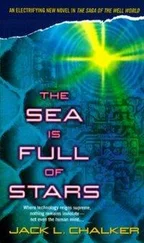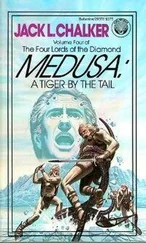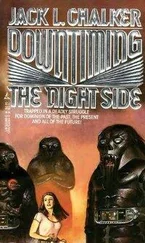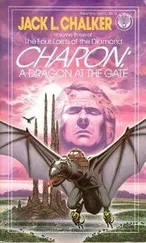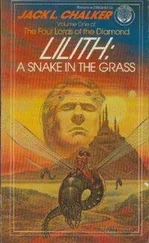“Where do they come from, then?”
She shrugged. “We have only a few here, partly for seasoning and partly for experimental purposes. They don’t let us have too many, and only when we have a specific individual in mind. They’re pretty careful.”
“But the whole thing is done here? All the mind-changing?”
“Oh, no. It can be done anywhere in the Warden system out to a point roughly one hundred and sixty million kilometers beyond the orbit of Momrath. Just as long as it’s done in an atmosphere containing only Cerberan Wardens. I don’t know the details.”
“And this doesn’t disturb you? That we’re using these to spy on the Confederacy?”
“Not really. Why should it? Everything that government does turns to dust or ashes, including the people. We have an entirely new, fresh technology here from an entirely nonhuman evolution, and that’s far more interesting. I can hardly blame them for not announcing themselves to the Confederacy. Every alien race we’ve ever touched we’ve murdered, literally or culturally.”
“You sound like you would have gotten sentenced here if you hadn’t come voluntarily,” I noted.
“Probably,” she laughed. “We’ll never know. But it worked out, anyway.”
I stared at her, thinking hard. “And you haven’t been able to solve the programming riddle? If you can’t, can anybody?”
She looked questioningly at Bogen, who nodded, and then she turned back to me. “It’s not all that simple. Here, let’s go over to the scope.”
We walked over to the instrument cluster. “I don’t recognize any of this,” I told her. “Whose is it? Your own design?”
“No. It’s supplied by the makers, too. That’s part of the problem. Here. Look in the screen.”
I looked, and saw a close-up of a cell. No, not a cell. Some sort of unicellular animal, it seemed, like the amoeba.
“That’s a cellular unit from one of the robots,” she told me. “It really isn’t a cell, although it acts like one. It’s a complete self-contained microcomputer using organic molecules and an organic structure.” She fiddled with a dial and the tiny thing was gone, replaced by a horde of tiny things swimming in a clear river.
“The molecular chemistry itself’s a nightmare,” she told me. “It’s not that we’re seeing anything unusual. No special elements we’ve never seen before, nothing like that. But they’re put together in a way I couldn’t even imagine. There is in fact no way I know to build or grow something like that, composed of all those elements and compounds, and make it work. For example, I can take carbon chains and sulfur and zinc, potassium, magnesium, and a hundred other compounds and elements and put them together—but never would I get something like that.” She shifted the focus to the cellular wall and blew it up almost impossibly large. “See those tiny little hairlike things? They’re the electrical connectors to the surrounding cells. Like nerves, yet not like them. Connected up, they form conscious communications system from cell to cell. The brain can tell any cell, or any cell group, what it wants the little bugger to do, look like—you name it, and it can do it. Mimic almost anything. Even functional things. Impossible. Inconceivable. Even in our best bad old days of the robot war we had nothing that could do that. We might have had, though, had they not banned further research and development.”
“I get the point. What you’re telling me is that even the Confederacy couldn’t reprogram or deprogram the things.”
“Nothing of the sort! Given one of these, they probably could. But we—we’re at a dead end. We are able to see how it’s done, but we can’t do it—or undo it—ourselves. And most important, we can’t tell the necessary programming from the unnecessary stuff. See?”
I did see. “But you think the Confederacy could?”
“Only because they have bigger, faster, quasi-organic devices themselves. I doubt if they could duplicate this, but they could probably tell it what to do. That’s why each cell has a self-destruct switch. If it’s incapacitated or in danger of capture, it simply melts down. All of it”
“Seen enough?” Bogen asked impatiently.
I nodded. “For now, anyway. I’m impressed, I have to say that.” I was more than impressed. The damned things scared me to death.
CHAPTER SIXTEEN
Wagant Laroo
I spent an extremely comfortable night in one of the guest rooms, surrounded by old masters and sleeping in the kind of computer-controlled luxury I’d almost forgotten existed. I slept late, knowing I might need all my wits about me, and had a sumptuous brunch; then, with the permission of the National Police, and under their extremely watchful eyes, I toured the collections upstairs. All in all it was a fascinating day as well as providing solutions to enough unsolved spectacular thefts to earn any cop a seat in the hall of fame, if they have one.
In the late afternoon a flier approached and landed on the front lawn I still found so nice. Out stepped five men, each carrying a briefcase. There was nothing particularly unusual about any of them, so I could only stare out the window and wonder which was Laroo.
That, it seemed, was the real trick.
“You never know which one of the party is him,” Bogen warned me. “He has about two dozen people that are so good at acting that they actually represent him at various functions, and he usually travels with a group. He can be any one of them—and you’re never sure if you’re talking to the real one or not.”
That made me a little nervous. “So the real one might not be here at all.”
“Oh, one of ’em’s him, I guarantee. This is that kind of decision. The best way is just to treat any of ’em as if he were Laroo. The real one’ll get everything.”
I nodded uneasily, and we went down to the Lord of the Diamond’s elaborate office. The idea that Laroo played such tricks made me a bit uneasy. Another thing that could go wrong, I thought nervously.
I was ushered in and introduced to a tall, handsome man with prematurely white hair that gave him the look of a distinguished politician. I looked over at the others. One of them was short and fat and looked a little like Otah, but hardly anything like I imagined the Lord of Cerberus should look. I’d pick that one, I noted to myself. Nobody could ever take somebody who looked like that seriously as a dictator. I looked around at the others sitting there, relaxed, eyes on me. I wondered if they knew who was who right now.
I went up to the Laroo indicated, stopped, and bowed slightly.
He put out his hand and flashed a politician’s smile. “You don’t have to go through that shit,” he told me pleasantly. “We’re all businessmen here. Here, have a seat and make yourself comfortable.”
I did as instructed. He just sat there a moment, looking me over. “So you’re a First-Class Assassin,” he finally said.
“Was,” I responded, relaxing a bit “I’m no longer interested in that part of the work.”
“I’ve viewed the tape of your conversation with Bogen yesterday and checked the instrument readings. It seems we have a truly valuable and interesting man in you, Zhang. I’m curious, though. If you volunteered for all this, why did you turn yourself around?”
“I didn’t volunteer,” I told him truthfully. “I was nominated, elected, put to sleep, briefed, and woke up on the prison ship.”
He laughed at that. “Sounds like ’em, all right. And now you’re in business for yourself. Well, I have a few more questions of a more practical nature.”
“Fire away.”
“First, assuming we let you go ahead with this, what guarantees do we have that you won’t double-cross us?”
Читать дальше



